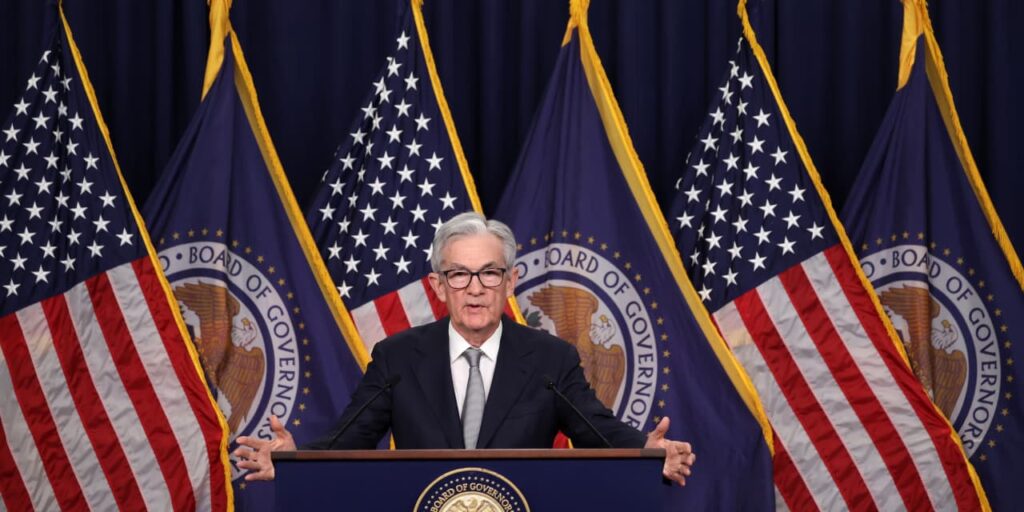Investors got several doses of positive news this past week, in the form of a Federal Reserve on pause in raising interest rates, jobs growth in the Goldilocks zone, and less U.S. Treasury bond issuance than feared.
Although the message from the busiest week of earnings season has been a bit more mixed, there are more reasons for optimism now than in some time.
Profits for the third quarter were generally solid—
S&P 500
companies are on track for a return to profit growth—but many companies’ financial forecasts fell flat. That is a negative for stocks, but the market has been driven by macroeconomics, rather than profits, for most of 2023.
That doesn’t appear to be changing just yet. Both stocks and bonds have surged this week, bouncing back from sharp declines seen since the late summer.
On Wednesday, the Federal Open Market Committee held interest rates steady as expected and Jerome Powell said what the market wanted to hear at his postmeeting press conference. The Fed chairman emphasized that while the inflation fight isn’t over yet, the balance of risks is shifting and officials are paying more attention to tighter financial conditions and signs of a slowing economy.
Earlier, on Monday, the U.S. Treasury said that it wouldn’t need to issue as much debt this quarter as it had earlier expected, citing better tax receipts.
Then on Friday, the October employment report came in at a not-too-hot, not-too-cold level. The U.S. economy added 150,000 nonfarm jobs last month—a pronounced slowdown from September’s torrid pace of hiring, but nothing suggesting that a recession is near.
“There will be two employment reports and two [inflation reports] before the next FOMC meeting on December 13,” wrote Santander U.S. Capital Markets economist Stephen Stanley on Friday. “So today will not be the last word on the labor market, but if I were a Fed official who already wanted to stand pat at the current rate level, this report would definitely raise my conviction level.”
It was the kind of Fed speak and the type of jobs report that get investors excited about the potential for a so-called soft landing for the U.S. economy, in which growth slows and inflation subsides without a painful recession.
Bond prices have rallied too, pushing down their yields, following the Treasury issuance announcement and as traders have priced in looser Fed policy next year.
Prices of interest-rate futures now imply just a 7% likelihood of a quarter-point rate increase at the Fed’s December meeting, down from close to 50/50 odds a month ago, after red-hot September economic data. Pricing also now implies nearly a full percentage point of rate cuts by the end of 2024, versus half a point at the start of this week.
The yield on the 10-year U.S. Treasury note, which tested 5% in October, was down to 4.52% on Friday morning for a decline of more than 0.4 percentage point in two weeks.
Lower bond yields are a positive for stock valuations, just as recent declines in share prices have made many companies appear much more attractively valued.
“At the start of the week, the S&P 500 sat at about 17 times 12-month forward earnings. Stripping out the Magnificent 7, this multiple stood closer to 15x,” wrote Solita Marcelli, chief investment officer for the Americas at UBS Global Wealth Management, on Friday. “In our view, such multiples look fairly reasonable considering our base case for a softish economic landing.”
Accordingly, it has been an everything rally. At least 10 of the S&P 500’s 11 sectors have gained on all five trading days this week.
And the small-cap Russell 2000 is up nearly 8% since last Friday’s close. That puts it on pace for its largest weekly gain since June 2020, during the early innings of the rebound from the Covid-19 selloff.
A lot can and will happen between now and the end of 2024, but the current setup is bullish for stocks and bonds, even if it may take a retest or two of the market’s lows before a sustainable rally takes hold.
Write to Nicholas Jasinski at nicholas.jasinski@barrons.com
Read the full article here

